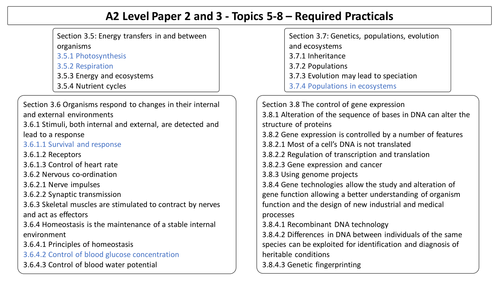




Section 3.5: Energy transfers in and between organisms
3.5.1 Photosynthesis
3.5.2 Respiration
3.5.3 Energy and ecosystems
3.5.4 Nutrient cycles
Section 3.6 Organisms respond to changes in their internal and external environments
3.6.1 Stimuli, both internal and external, are detected and lead to a response
3.6.1.1 Survival and response
3.6.1.2 Receptors
3.6.1.3 Control of heart rate
3.6.2 Nervous co-ordination
3.6.2.1 Nerve impulses
3.6.2.2 Synaptic transmission
3.6.3 Skeletal muscles are stimulated to contract by nerves and act as effectors
3.6.4 Homeostasis is the maintenance of a stable internal environment
3.6.4.1 Principles of homeostasis
3.6.4.2 Control of blood glucose concentration
3.6.4.3 Control of blood water potential
Section 3.7: Genetics, populations, evolution and ecosystems
3.7.1 Inheritance
3.7.2 Populations
3.7.3 Evolution may lead to speciation
3.7.4 Populations in ecosystems
Section 3.8 The control of gene expression
3.8.1 Alteration of the sequence of bases in DNA can alter the structure of proteins
3.8.2 Gene expression is controlled by a number of features
3.8.2.1 Most of a cell’s DNA is not translated
3.8.2.2 Regulation of transcription and translation
3.8.2.3 Gene expression and cancer
3.8.3 Using genome projects
3.8.4 Gene technologies allow the study and alteration of gene function allowing a better understanding of organism function and the design of new industrial and medical processes
3.8.4.1 Recombinant DNA technology
3.8.4.2 Differences in DNA between individuals of the same species can be exploited for identification and diagnosis of heritable conditions
3.8.4.3 Genetic fingerprinting
As well as sheets on the A2 required practicals required and the techniques that they should be aware of.
Similar structure to my previous AS resource https://www.tes.com/teaching-resource/aqa-biology-new-as-specification-revision-diagrams-for-topic-1-2-3-and-4-and-required-practicals-11634215
All page numbers are relating to Oxford AQA Biology 2nd Edition A Level textbook by Glenn Toole and Susan Toole 2015. Diagrams are also from this source.
3.5.1 Photosynthesis
3.5.2 Respiration
3.5.3 Energy and ecosystems
3.5.4 Nutrient cycles
Section 3.6 Organisms respond to changes in their internal and external environments
3.6.1 Stimuli, both internal and external, are detected and lead to a response
3.6.1.1 Survival and response
3.6.1.2 Receptors
3.6.1.3 Control of heart rate
3.6.2 Nervous co-ordination
3.6.2.1 Nerve impulses
3.6.2.2 Synaptic transmission
3.6.3 Skeletal muscles are stimulated to contract by nerves and act as effectors
3.6.4 Homeostasis is the maintenance of a stable internal environment
3.6.4.1 Principles of homeostasis
3.6.4.2 Control of blood glucose concentration
3.6.4.3 Control of blood water potential
Section 3.7: Genetics, populations, evolution and ecosystems
3.7.1 Inheritance
3.7.2 Populations
3.7.3 Evolution may lead to speciation
3.7.4 Populations in ecosystems
Section 3.8 The control of gene expression
3.8.1 Alteration of the sequence of bases in DNA can alter the structure of proteins
3.8.2 Gene expression is controlled by a number of features
3.8.2.1 Most of a cell’s DNA is not translated
3.8.2.2 Regulation of transcription and translation
3.8.2.3 Gene expression and cancer
3.8.3 Using genome projects
3.8.4 Gene technologies allow the study and alteration of gene function allowing a better understanding of organism function and the design of new industrial and medical processes
3.8.4.1 Recombinant DNA technology
3.8.4.2 Differences in DNA between individuals of the same species can be exploited for identification and diagnosis of heritable conditions
3.8.4.3 Genetic fingerprinting
As well as sheets on the A2 required practicals required and the techniques that they should be aware of.
Similar structure to my previous AS resource https://www.tes.com/teaching-resource/aqa-biology-new-as-specification-revision-diagrams-for-topic-1-2-3-and-4-and-required-practicals-11634215
All page numbers are relating to Oxford AQA Biology 2nd Edition A Level textbook by Glenn Toole and Susan Toole 2015. Diagrams are also from this source.
Something went wrong, please try again later.
Fabulous resource - just what I needed today!
AN EXTENSIVE AND USEFUL PACK OF RESOURCES ORGANISED NEWLY. THANKS.
Super - this has saved me a job of adapting my old spec versions :D
Brilliant. Thanks for sharing
Great resources - thank you.
Report this resourceto let us know if it violates our terms and conditions.
Our customer service team will review your report and will be in touch.
£0.00
